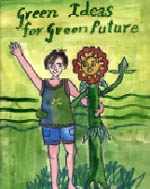|
CLEAN – Bangalore:
"And Miles to Go…" Chaya Chengappa and V.A. Abraham, DA, Bangalore cleanbangalore@hotmail.com H aving initiated the CLEAN-Bangalore programme in 1999, we have seen a change in the overall activity profile. During the first year our focus was on getting some of the activities going on in as few as three schools. In the second year we initiated a few action programmes and more schools joined the network. During the third year, we had seven more schools join the CLEAN network. Even though many activities have been initiated and there is more acceptance of the programme, we know that we have miles to go ….During the last three years we have trained over 300 children in water quality monitoring using the Jal TARA water testing kit. All the workshops are designed to encourage active participation and interaction among the students. Using the Jal TARA kit the children have analysed water samples from over 70 different sources such as municipal, ground and surface water bodies. They have found that the quality of the municipal supply is by and large good, while the ground water had high nitrate content in a few places indicating sewage contamination. Most of the lakes that have been tested are not fit for aquatic life. A major problem in Bangalore is that of garbage mismanagement and we have trained over 100 children in solid waste management using the vermicomposting technology. During the workshops the children were given practical orientation to vermicomposting, which has encouraged them to initiate the same in their schools. A few schools have initiated vermicomposting in tanks while a few others have started demonstrative units in plastic tubs. During the course of the programme children have also been made aware of critical environmental issues facing us through interactive activities and films. In order to make the children aware of the importance of conserving our medicinal plants, a few plants were distributed to schools to start a herbal garden. The Karnataka Forest Department also gave us tree saplings to be distributed freely to schools. A few schools have planted the saplings in their campus as well as on the roadside. Communication on environmental issues has also been one of the main focuses during the last year. The CLEAN Bangalore newsletter has also been helping the children to share their views and voice their concerns on the environment of the city. We have many more activities lined up for school children in the future and as the network increases, the CLEAN programme would become much more effective in creating large scale awareness and initiating several improvement programmes at different levels namely, school and community. An important aspect of the programme during the last year was the zeal children had in carrying out all the activities. Like for example, when a film on the damage done to the forests of Western Ghats due to iron ore mining in Kudremukh was screened, all of them wanted to do something about it. They have proposed a rally, campaigns and other ways to get the government to show more concern for the precious forests. q
|
